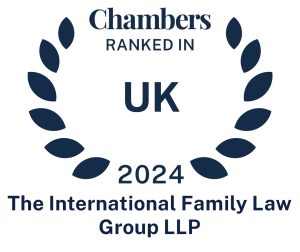According to the Federal Authority for Identity and Citizenship, UAE:
‘The aim is to give women the opportunity to adjust their social and economic status after the loss of the head of the family’
What are the new Rules for Divorcees in UAE?
- Since 21 October 2018 divorcees living in the UAE are eligible for a one-year extension of a residency visa in their own name from the date of divorce
- The children residing in the UAE at the time of the divorce also then become dependants on the mother’s visa (and significantly will no longer be tied to the sponsorship visa of the other parent)
It has also been commented that the year period provides some time in which to seek employment in the UAE or leave the country (although it is unclear whether they can leave the country with the children after that year without the other parent’s consent).
Why is this important?
At iFLG we have had a number of UAE cases where the spouse with the sponsorship Visa for work commonly also controls the Visa status for the entire family. Sadly, the expatriates in the UAE also seem familiar with the imbalance of power this can give the spouse holding the sponsored visa.
This power over the residency and right for the other spouse to remain in the UAE produces some of the most tragic and seemingly unjust areas of our work in international family law.
Often without prior notice or awareness, the sponsored spouse (commonly in the UAE, still the husband) uses this fact as leverage for negotiating financial settlements on divorce which are less favourable to the other spouse along with child parenting arrangements including in which country the children can live as they are still on the sponsored spouse visa. This has led in extreme scenarios to the primary carer (usually the mother) being forced to leave the UAE without being able to take their children with them.
Whilst similar imbalances of power related to visas and residency rights of spouses can arise in many countries worldwide, the UAE, partly owing to it’s large expat community, has been one of the areas in the world where its misuse has been most rife and also potentially more far-reaching. There are additional factors, applicable to the UAE which can further compound the problems, particularly after divorce. These include:
- The theological and hence public policy incompatibility between local Sharia laws and laws made in other countries, particularly regarding child arrangements, but also in respect of financial orders
- The consequent lack of legal protections and laws for recognising or enforcing an order made outside the UAE
- The DIFC – LCIA Arbitration Centre (often used for international commercial disputes) cannot be applied to international family law issues, again owing primarily to the theologically incompatible approaches towards family life with the UAE. Some are however campaigning to introduce at least some scenarios where it might become possible to use the DIFC- LCIA for some financial family issues.
Conditions for the application:
- Proof of the divorce
- Proof that up to the date of divorce they were sponsored by their now ex-spouse
- The mother and any children produce a medical fitness certificate (and health insurance is required in some Emirates)
- Proof neither the applicant nor the children have any significant health issues
- Proof for some Emirates that they have health insurance
- Proof the applicant has a residence in the UAE (this is anticipated to mean a tenancy contract in their name).
- Proof that the applicant can support themselves and their children financially (this is a common problem for divorcees whose spouses do not support them financially after separation and where the rules for obtaining a bank account and hence a tenancy contract can be extremely difficult and time consuming)
So how might the new rules help divorcees?
The new visa rules represent a step in the right direction to help expatriate divorcees living in the Emirates. They therefore also potentially help to redress in some part the imbalance of power which can be exerted by the sponsored spouse.
However, prior to 21 October there were some options available for a divorcees for obtaining independent visas, but they often involved expensive trips to obtain regular, but temporary visas or having to find sponsorship via an employer.
There appear to remain substantial conditions (in particular the financial ones) which might mean that in practice these new visa rules actually provide far less of an extension to the rights of divorcee’s to reside in the UAE. Time will tell if this helps more divorcees. It does at least seem to represent a recognition by the UAE for the need for adjustments in their laws to meet the specific requirements of expatriates residing there.
How might these impact work in International family law?
Family law questions which arise also include:
- After the year-long period does the divorcee have any additional rights to remove the children from the UAE – or will this right just defer the risk of separation from their children?
- Will it impact our Wardship cases and in particular defences for alleged wrongful removal or retention of children to a return to the UAE.
- Does it depend what type of divorce has been granted? For example does a Talaq whereby the husband just repeats words to the effect of “I divorce you” three times constitute a valid divorce for these purposes? A Talaq is recognised as a legal divorce in the UAE?
In summary
We will need to wait and see to learn how the new rules work in practice and how they impact separating expatriate families in the UAE. iFLG will continue to watch and report on those developments.
If you or someone you know lives in the UAE and have concerns about their marriage and what a divorce might mean for their family, The International Family Law Group LLP (iFLG) are able to offer specialist family law advice in relation to children, divorce and financial issues as well as the options available to them to best protect their position.
Lucy Greenwood
[email protected]
The International Family Law Group LLP
www.iflg.uk.com
© October 2018
-
Lucy Greenwoodhttps://iflg.uk.com/team/lucy-greenwood
-
Lucy Greenwoodhttps://iflg.uk.com/team/lucy-greenwood
-
Lucy Greenwoodhttps://iflg.uk.com/team/lucy-greenwood
-
Lucy Greenwoodhttps://iflg.uk.com/team/lucy-greenwood









